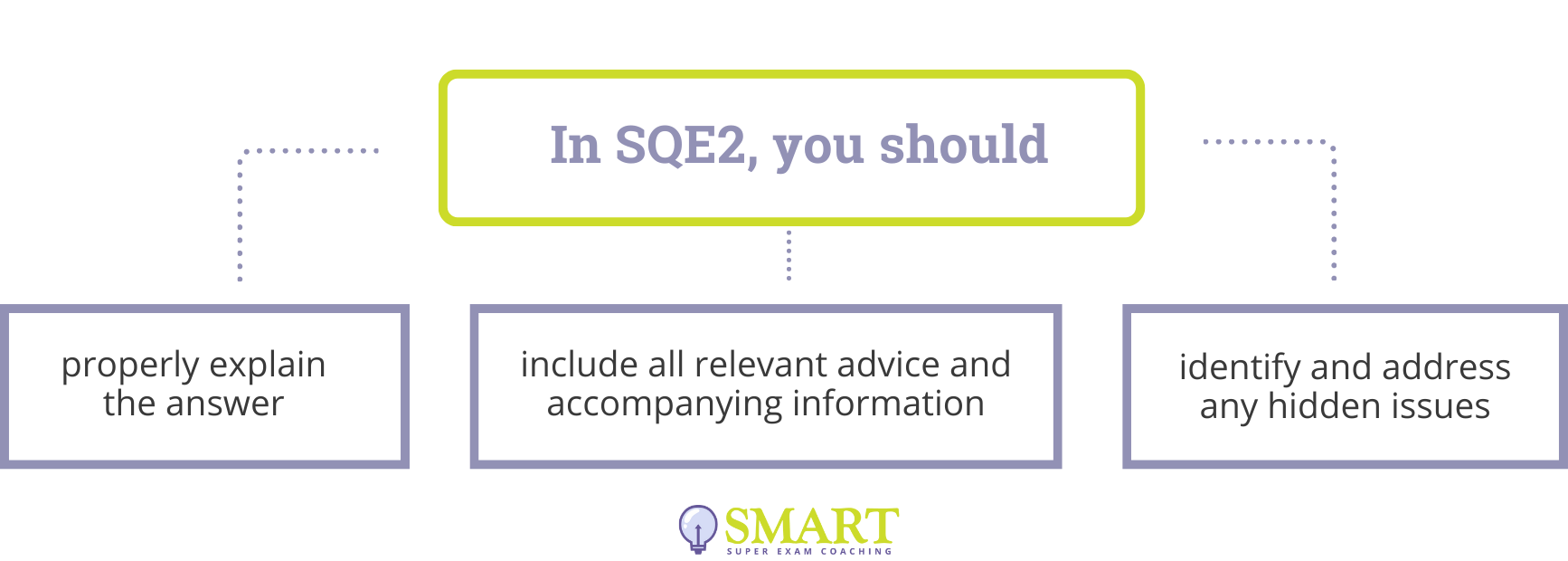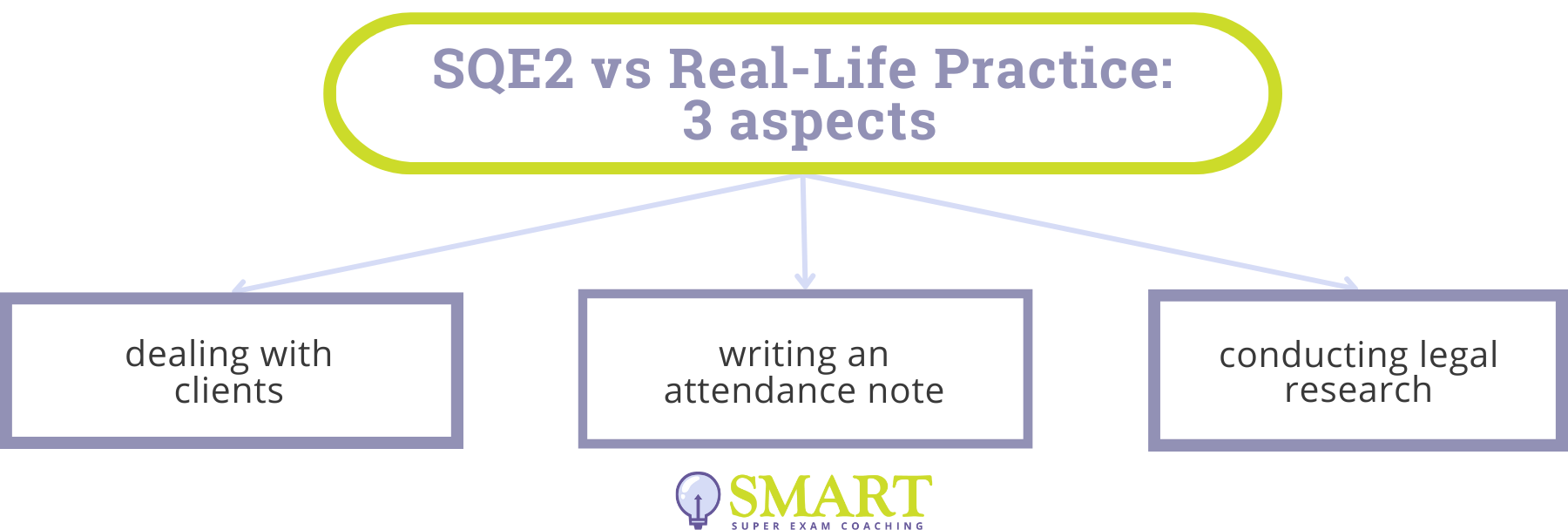Introduced in 2021, the Solicitors Qualifying Examination (SQE) is a two-stage assessment that includes a multiple-choice exam (SQE1) and a skills-based assessment (SQE2). This article will mainly focus on the second stage of the SQE, seeking to provide you with important insights and recommendations on how to pass the sqe2.
SQE2 methodology
First and foremost, it is crucial to have a clear understanding of the subject at hand. Let’s begin with the fundamentals – the methodology behind the SQE. The assessment method used in the SQE2 is based on Miller’s pyramid and known as the Objective Structured Clinical Examination (OSCE), which has traditionally been employed to evaluate the competence of medical doctors. Previously, it was also utilised in the Qualified Lawyer Transfer Scheme (QLTS) – the precursor to the SQE that served as a route for foreign lawyers to qualify as solicitors in England and Wales.
The 16 assessment stations in the SQE Stage 2 are based on simulations where you will assume the role of a newly qualified solicitor. Being a legal skills assessment, the SQE2 exam assesses candidates on both skills and application of law, with both of these components weighted equally. Let’s see how this applies to each of the SQE2 assessments:
| Skills | Law |
| Client interview and attendance note/legal analysis |
|
| Advocacy |
|
| Case and matter analysis | All areas of law |
| Legal research | All areas of law |
| Legal writing | All areas of law |
| Legal drafting | All areas of law |
SQE2 legal knowledge: correct and comprehensive
Covering a broad spectrum of topics in each legal area, the SQE2 exam evaluates your comprehension of legal principles and ability to apply them in real-life scenarios. This approach of linking theory to practice allows to eliminate the impact of the luck component on exam scores, and to establish less random and more reliable measures of candidates’ skills and knowledge.
When assessing the answers from aspiring solicitors, experienced legal assessors check them for correctness (SQE2 legal criterion No1) and comprehensiveness (SQE2 legal criterion No2). Therefore, in order to pass the sqe2 it is essential to:
- Properly explain the answer, referring to the given facts and providing justifications.
- Include all relevant advice and accompanying information on the issues at hand that may be required by the client.
- Identify and address any hidden issues and challenges that may arise.

Marking against these assessment criteria is at the discretion of SQE2 assessors and based on the scale below:
- Superior performance: well above the competency requirements of the assessment
- Clearly satisfactory: clearly meets the competency requirements of the assessment
- Marginal pass: on balance, just meets the competency requirements of the assessment
- Marginal fail: on balance, just fails to meet the competency requirements of the assessment
- Clearly unsatisfactory: clearly does not meet the competency requirements of the assessment
- Poor performance: well below the competency requirements of the assessment
SQE2 and Legal Practice Course
Unlike the SQE1, the SQE2 focuses on assessing your knowledge and skills in five specific areas of practice (for more information, please see SQE 2: Preparation for the Solicitors Qualifying Examination). It can be viewed as an advanced version of the Legal Practice Course (LPC) with a greater emphasis on practical aspects, similar to the seats requirements in a training contract.
While LPC graduates may surely have certain advantages over other aspiring solicitors in the qualifying assessments, they still require in-depth preparation for the SQE exams. Though being a challenging course, the LPC is still less practice-oriented compared to the SQE – which assesses both legal knowledge and skills. Additionally, some aspects of the functioning legal knowledge (FLK) tend to be overlooked by LPC training providers. With this in mind, it seems prudent to check the SQE1 syllabus for comprehensive coverage of the subject matter tested in the SQE. In the SQE Stage 1, the core legal principles and rules are included in two parts of the exam – FKL1 and FKL2 assessments.
If you are an LPC graduate, you can consider making the following adjustments to your SQE preparation:
- Focus on advancing your legal knowledge.
- Allocate time to learn new topics that may not have been covered in your LPC studies.

Additionally, in the SQE2 assessment, there are no answer options to choose from, and this can be further complicated by situations with no definitive right or wrong answer. In such cases, it becomes crucial to effectively argue your case to convince the assessor and achieve a higher score. This is especially true for client interviews – where the client has no legal expertise. So, how to pass the sqe2?
To mirror exam conditions and let you experience the assessment long before the exam dates, we offer SQE2 preparation designed as one-on-one mock stations with individualised feedback. This approach has helped hundreds of law professionals to provide well-grounded and comprehensive answers and sweep through the solicitors qualifying exam. By honing your skill of presenting convincing arguments, you enhance your chances of success and demonstrate your readiness for real-world legal scenarios. Furthermore, we teach the law using simulated scenarios covering a broad range of realistic situations, which provides an additional opportunity to deepen and reevaluate the knowledge you obtain from law books.
SQE2 skills: recreating exam conditions
One of common misconceptions among aspiring solicitors, particularly those with practical experience, is assuming that the skills tested in the SQE2 exam closely mirror those of real-life legal practice. However, this is not the case – and not just due to time constraints. Let’s consider a few examples:
- Dealing with Clients: While clients may present challenging situations, it is not common to regularly encounter clients who withhold crucial facts or become emotional during the interaction. The SQE2 scenarios are designed to test your ability to handle such situations effectively.
- Writing an Attendance Note: Writing a comprehensive attendance note including facts and legal analysis, is not a common occurrence in real practice. This assignment assesses your ability to prioritise information and convey key details efficiently.
- Conducting Legal Research: Real-world legal research often involves analysing complex materials from LexisLibrary or Westlaw. In the SQE2 however, you will be provided with a bundle containing primary and secondary sources, some of which may be irrelevant to the case at hand. Thus your SQE2 mark will depend on your ability to navigate such resources and extract relevant information from them.

While providing a valuable measure of competence, the SQE2 exam does not replicate the full scope and dynamics of real legal practice. In order to get a pass mark, one should work out effective exam tactics and techniques – which is exactly what we aim at in OSCEsmart SQE2 training course. The vast majority of our tutoring solicitors have first-hand experience of passing the qualifying exams (SQE and QLTS OSCE). At our 1-to-1 simulations, we gladly share effective tips and exam tactics, giving you step-by-step guidance. It is essential in order to pass the SQE2 exam.
To make OSCEsmart individual mocks more available, we have opted out of expensive (and demanding) package deals. Instead, you can gauge your readiness by doing a few mock exams with us, and decide which of your SQE2 skills require further practice. To allow you to reap maximum benefits however, we strongly advise starting your one-to-one mocks well in advance in order to:
- Develop exam techniques: Based on our experience, one SQE mock is normally not sufficient to fully grasp the exam techniques and address potential challenges. Give yourself time to practise and refine your approach.
- Identify gaps in your knowledge: Our SQE2 mock exams are designed to help you to identify gaps in your knowledge and provide recommendations for further reading. Closing these gaps requires additional time and effort on your part.
- Enjoy flexibility in scheduling mocks: We pride ourselves on offering personalised 1-to-1 mock exams, a service that sets us apart from other SQE training providers. As the exam date approaches, our availability may be limited. It is advisable to book and schedule your mocks in advance – which can be done on our user-friendly Superexam platform.

With OSCEsmart, your SQE prep is based on personal exam experience and years of active teaching for the qualifying exams. Investing time and effort in personalised mock exams is a reliable way to test your readiness for the SQE2 assessment, address any knowledge gaps, and refine your exam techniques in a focused and effective manner. We will help you to pass the SQE2.


